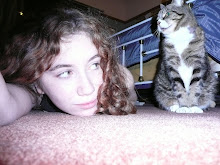
December 14, 2008 was a Sunday that still sticks out in my mind. Partly because it was the night my drummer/emotional-baggage told me he that he didn’t want to be more than friends, but mainly because it was the night I saw
Baseball. The Zoo was hosting part of a rescheduled Australian tour for American indie-folk band,
The Mountain Goats. Emotional baggage and his two friends reminisced enthusiastically about the band’s previous tour, and I sported my best training-wheels, having only listened to
Heretic Pride and other albums as much as physically possible in the past week.
As always, the venue occupied a pleasantly-sized crowd in the dim red surroundings, and after attaining our own piece of floor space and liquid provisions, we eyed-off the empty stage. Now, I know that we were there to pay our respects to The Mountain Goats, and I honestly enjoyed their set. Even if John Darnielle looked like a Sunday-school teacher and had to hand the mic over to the other guy because of his recent bout of tinnitus. True to form, I was fascinated by the support act.
Amidst the sea of self-cut hairstyles and general merriness, the band members introduced themselves to their instruments and prepared to open the show. Then, out of the curtains on side of stage, emerged this disheveled looking creature with a violin. Hurriedly, the lead singer stepped out towards the crowd, looking as if he’d fallen asleep momentarily in the bathtub backstage and had to be woken abruptly by the rest of the band.
When the music started, the microphone was poised above the guy’s head, meaning that every word he sang involved him arching his neck back. Then into it, he’d release these strange lyrics in distraught and raucous shrieks, seemingly directed to some higher power that had wrongly forsaken him in his past. Accompanying the hysteria of his vocals was the absolutely mesmerizing attack he brought upon his violin. To provide an accurate description of the experience is to say that he practically raped classical music, shredding the bow so violently across the surface of the strings that strands of horse hair gradually began to break off and sway fluidly in time with his movements.
Equally as impressive was the drummer, whose skill for artfully hitting things was only matched by her awesome backing vocals. You see, I’m always heartily impressed by wild and vivacious female rockers – and this usually involves guitarists, or as I like to say, ‘chicks-with-picks’ – but I’ve gained a new appreciation for ‘chicks-with-sticks’ ever since witnessing a local
I Heart Hiroshima gig. After watching Baseball, Evelyn Morris was decidedly another drummer to add to the list.
 Animal Kingdom
Animal Kingdom is the band’s debut album. Released early last year, it boasts fourteen zany and infectious tracks that you’ll want to sew into a quilt and fall unconscious in. So go get it! You know you want to. Melbourne-grown four-piece, Baseball, is a perfect collision of punk, DIY ethic, and Eastern European instrumental chaos that is definitely worth checking out.
Plus, any band that pays tribute to
Pixies can have the whole sheet of gold stars as far as I’m concerned.









